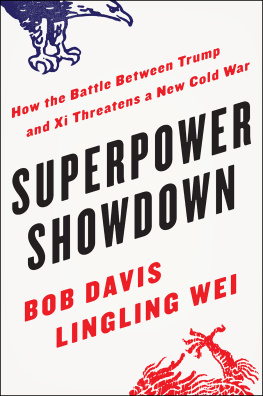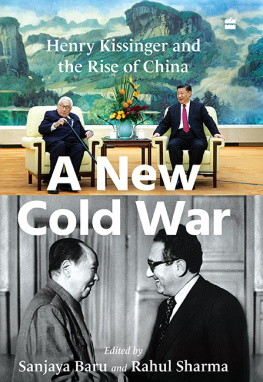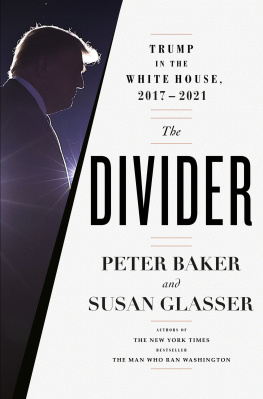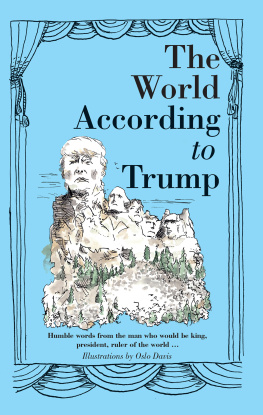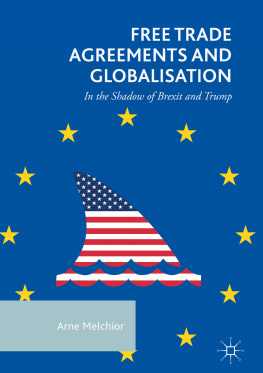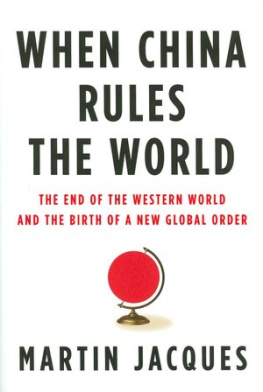Contents
From Bob:
To Mike and Doris Davis, and Debra Bruno, who have filled my life with love.
From Lingling:
To Zhong Guang, and to Zhong Lina and Wei Gengfu, for never giving up.
This book is based primarily on hundreds of interviews in Washington, D.C., and Beijing over the past three years with government officials, former government officials, and the outsiders they ask for advice. Covering government officials in the two capitals is different in many ways, reflecting the different political systems. But in one big way its similar: officials and other participants rarely are willing to talk candidly on the record.
To get to the truth we had to assure anonymity. Under the ground rules we established, we could use information from the interviews, but we couldnt say who provided it. Journalists and officials use different terms for this arrangementusually deep background or off-the-record. There is no precise meaning for either term. To try to avoid misunderstanding, we explained to those we interviewed that we planned to use the information they provided although we wouldnt say who revealed the scenes and information we describe.
If we were doing a story for the Wall Street Journal based on these interviews, we would have attributed many of the anecdotes to people familiar with the events or to senior government officials, depending on who told us what. We dispense with those attributions in this book.
A journalist we both greatly admire, the Washington Posts Bob Woodward, uses a similar arrangement in his many books about Washington. We generally followed that approach but modified it.
Readers rightly complain that it is difficult to judge the authenticity of works of journalism because sources arent identified. But, as we say, to get the truth, we often had to agree to anonymity. If sources are identified in Washington, they could lose their jobs or standing. In Beijing, the punishment could be much worse.
There are times, however, when sources will allow themselves to be quoted on the record. Even if those quotes are sometimes anodyne, we think they help readers judge whether to trust the account. When participants in the events agreed to go on the record, we note it by putting the quote in present tense and generally adding a modifier like, says in an interview. We also note the interview in the endnotes.
That doesnt mean that other times the person is cited or quoted in a scene that the person is the source of the information. Rather the material comes from a combination of government officials, former officials, and the people they talk to, sometimes bolstered by contemporaneous notes.
We realize this isnt a perfect solution. But we hope that the arrangement gives readers additional assurance of our efforts to get the story right.
Introduction
Threat of War, December 2018
A month after the 2018 midterm elections, chief executives of seventy-five of the nations leading manufacturing, technology, and financial firms gathered at the Four Seasons Hotel in the Georgetown section of Washington, D.C., to hear from top Trump administration officials. It was a chilly day and a gloomy time for the White House.
Republicans had come up short in the elections, losing control of the House of Representatives. The stock market was deep into a fall swoon. White House turmoil was deepening, as the chief of staff was about to resign. On that December 4, Washington was also preparing for the funeral the following day of President George H. W. Bush, who seemed like a leader from some Paleolithic period when politicians spoke civilly and soap-opera drama was reserved for TV.
The CEOs had a different concern on their minds: China. How badly were U.S.-China relations deteriorating? Was the trade war between the two nations spinning out of control? Should they remake their business strategies and assume that tariffs, sanctions, and indictments would permanently limit trade and investment between the two nations?
The group was part of what the Wall Street Journal calls its CEO Councilabout two hundred companies that pay $24,800 a year to have senior executives join sessions in Washington and elsewhere around the world with policy makers. Sitting on a conference room stage, Wall Street Journal reporters and editors pepper administration officials with questions. The audience gets to vote on a question chosen by the editor, with the results displayed on an electronic screen at the front of the room.
The Wall Street Journals editor-at-large, Gerard Baker, an acerbic Brit, faced off with John Bolton, who was then the administrations national security advisor. The formal topic was American Business in the World, but Baker moved immediately to China.
President Donald Trump and Chinese President Xi Jinping had met for dinner three days earlier in Buenos Aires, Baker reminded the audience. The two leaders had reached a ninety-day truce during which the United States promised to suspend its plans to raise tariffs.
President Trump has certainly described [the meeting] in almost a 1938 Neville Chamberlaintype way. Peace in our time, Baker said, egging on Bolton, who had sat in on the Argentina dinner.
I wouldnt say that, Bolton responded, laughing.
In quick succession, the blunt-speaking Bolton accused China of stealing U.S. intellectual property, forcing companies to give up technology against their will to their Chinese partners, and spying on U.S. firms. Sure, China was talking about buying more U.S. soybeans, he continued, and that was fine. But it was hardly enough to get the United States to back off.
We dont see the American future being a Third World country supplying natural resources and agricultural products to China, Bolton said. We need to see some major changes in their behavior. Structural issues, if you will.
Without these changes, he continued, there would be more punishment. How about a rule that says there will be no imports into the United States of any products or services that are based on the theft of American intellectual property? he said. What Bolton left unsaid was just as important. Who would determine whether Chinese imports were based on theft? Obviously, some U.S. agency. How would it decide? Anyones guess. That could give the U.S. government authority to ban any import at any timean enormous expansion of U.S. punitive power aimed at Beijing.
Is that something the president and the administrations proposing? Baker asked.
We may have some authority in that area already, Bolton said. We may need additional legislation. But this is what were talking about.
The United States clearly had misread Chinas rise, he went on. American policy was based on the assumption of bringing China into the WTO [World Trade Organization] would increase pressure to conform to international norms in trade and business areas. That has obviously not happened. We had decades of people who said the modernization and economic growth of China would produce increased political freedom and more representative government. That hasnt happened, either.
Baker then posed a question to the audience: Will the U.S. and China find themselves at war sometime in the next twenty years? That is, a real war, between two nuclear-armed nations that account for 40 percent of the worlds gross domestic product (GDP), not simply a trade war. U.S. soldiers firing on Chinese soldiers; Chinese missiles raining down on U.S. aircraft carriers.
Half those voting in the audienceCEOs and other senior executives of companies whose predecessors had lobbied for China to join the WTO and who had counted on the kinds of political change in China that Bolton was deridingsaid yes, the two nations were bound for war.
I mean, actually, how do you respond to that? Baker asked Bolton.

